2 min to read
Flask RESTful API services Boilerplate with Swagger-UI

A minimal boilerplate for creating RESTful services using Flask, SQLAlchemy and Flask-RestPlus. This boilerplate has swagger-UI added to it for easy documentation of the endpoints. The boilerplate also has capabilities for adding a database engine to your API services with the help of SQLAlchemy.
What it includes?
- capabilities of establishhing connection to any database using
SQLAlchemy. - a
service loggerfor logging all the events, warnings, errors, etc. - a placeholder for declaring all your
constants. - a placeholder for all your declared
database models. - entire codeset is config-driven.
- hosting of
swagger-UIfor your RESTful API’s documentation. - hosting
multiple namespacesin the routes. - a
custom response generatorfor the payloads.
Setting up:
- install all the requirements from
requirements.txt
pip install -r requirements.txt - make necessary changes in
config.ini- add
hostaddress (default=”127.0.0.1”) - add
portaddress (default=5000) - set a
namefor the flask restful service (default=”flask-minimal-boilerplate”) - add the
database url(default=”postgresql://scott:tiger@localhost/sample_db”)
- add
- create a directory called logs in the current working directory. This is where all your log fiels will be stored.
Directory structure:
├── src
│ ├── core
| | ├── db_connection.py
| | ├── models.py
│ ├── instance
| | ├── config.py
| | ├── flask_app.py
│ ├── misc
| | ├── constants.py
| | ├── db_misc_functions.py
| | ├── response_generator.py
| | ├── service_logger.py
│ ├── routes
| | ├── item_1
| | | ├── item_1_route_1.py
| | ├── item_2
| | | ├── item_2_route_1.py
│ ├── namespaces.py
├── config.ini
├── requirements.txt
├── run.py
Running the program:
- after having setup everything above, run the program using
python run.py
Feel free to fork the boilerplate on GitHub for your personal use.
If you liked this project, please consider buying me a coffee


Comments